Kehrs sign - Study guides, Class notes & Summaries
Looking for the best study guides, study notes and summaries about Kehrs sign? On this page you'll find 42 study documents about Kehrs sign.
Page 4 out of 42 results
Sort by
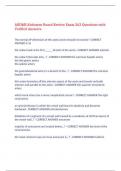
-
ARDMS Abdomen Board Review Exam 262 Questions with Verified Answers,100% CORRECT
- Exam (elaborations) • 24 pages • 2023
-
- $12.99
- + learn more
ARDMS Abdomen Board Review Exam 262 Questions with Verified Answers The normal AP dimension of the aorta lumen should not exceed - CORRECT ANSWER 3 cm the celiac trunk is the first _____ branch of the aorta - CORRECT ANSWER anterior the celiac trifurcates into...? - CORRECT ANSWER the common hepatic artery the left gastric artery the splenic artery the gastroduodenal artery is a branch of the...? - CORRECT ANSWER the common hepatic artery this artery branches off the anterior ...
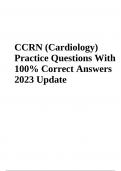
-
CCRN Exam Practice Questions With Correct Answers | Latest 2023/2024 | Graded A+
- Exam (elaborations) • 19 pages • 2023
-
- $18.49
- + learn more
49 year old male with inferior wal MI resulting from 100% occlusion of the RCA. The 12 lead reveals ST elevation in leads II, III, aVF. Where would you see reciprocal changes? - ANS-I, aVL RCA perfuses inferior wall and reciprocal changes would be seen in high lateral wall which is reflected in I and aVL. 46 yo w: pneumonia and sepsis. Treated with 4 days of abs and fluids. Increasingly SOB and now 100% via non-rebreather. ABG 7.20, paCO2 68, PaO2 102, HCO3 28. Bilateral infiltrates. Pt i...
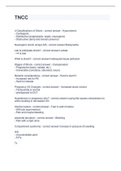
-
TNCC questions and answers 2022/2023
- Exam (elaborations) • 5 pages • 2022
-
Available in package deal
-
- $11.49
- + learn more
4 Classifications of Shock - Hypovolemic - Cardiogenic - Distributive (anaphylactic, septic, neurogenic) - Obstructive (tamp and tension pneumo) Neurogenic shock unique S/S Bradycardia 00:53 01:35 Lab to anticipate shock? Lactate - >4 is bad What is shock? Inadequate tissue perfusion Stages of Shock - Compensated - Progressive (tachy, lactate, etc.) - Irreversible (comatose, obtunded, neuro) Bariatric considerations - Hard to start IV - Increased ...
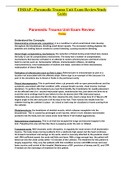
-
FISDAP - Paramedic Trauma Unit Exam Review/Study Guide
- Exam (elaborations) • 6 pages • 2022
-
- $10.49
- + learn more
Understand the Concepts: Disseminating intravascular coagulation: it is a condition in which small blood clots develop throughout the bloodstream, blocking small blood vessels. The increased clotting depletes the platelets and clotting factors needed to control bleeding, causing excessive bleeding. Hemorrhagic compensatory mechanisms: the reduction of blood during acute blood loss causes the body to use its compensatory mechanisms. The body has a number of compensatory mechanisms that become act...
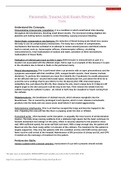
-
FISDAP - Paramedic Trauma Unit Exam Review/Study Guide
- Exam (elaborations) • 5 pages • 2022
-
- $10.49
- + learn more
Understand the Concepts: Disseminating intravascular coagulation: it is a condition in which small blood clots develop throughout the bloodstream, blocking small blood vessels. The increased clotting depletes the platelets and clotting factors needed to control bleeding, causing excessive bleeding. Hemorrhagic compensatory mechanisms: the reduction of blood during acute blood loss causes the body to use its compensatory mechanisms. The body has a number of compensatory mechanisms that become act...
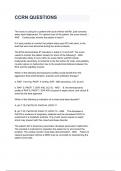
-
CCRN QUESTIONS And Answers Rated 100% Correct
- Exam (elaborations) • 24 pages • 2024
-
- $10.89
- + learn more
CCRN QUESTIONS The nurse is caring for a patient with acute inferior wall MI, post-coronary artery stent deployment, For optimal care of the patient, the nurse should: - ANS Continuously monitor the patient in lead II It is best practice to monitor the patient status post PCI with stent, in the lead that was most abnormal during the acute occlusion. The ECG demonstrates ST elevation in leads II, III and aVF. The nurse needs to monitor the patient closely for which of the followi...
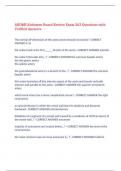
-
ARDMS Abdomen Board Review Exam 262 Questions with Verified Answers,100% CORRECT
- Exam (elaborations) • 24 pages • 2023
-
- $12.99
- + learn more
ARDMS Abdomen Board Review Exam 262 Questions with Verified Answers The normal AP dimension of the aorta lumen should not exceed - CORRECT ANSWER 3 cm the celiac trunk is the first _____ branch of the aorta - CORRECT ANSWER anterior the celiac trifurcates into...? - CORRECT ANSWER the common hepatic artery the left gastric artery the splenic artery the gastroduodenal artery is a branch of the...? - CORRECT ANSWER the common hepatic artery this artery branches off the anterior ...
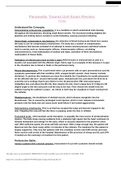
-
FISDAP - Paramedic Trauma Unit Exam Review/Study Guide| Paramedic_Trauma_Unit_Exam_Review
- Exam (elaborations) • 5 pages • 2022
-
- $12.49
- + learn more
Paramedic Trauma Unit Exam Review: Fisdap Understand the Concepts: Disseminating intravascular coagulation: it is a condition in which small blood clots develop throughout the bloodstream, blocking small blood vessels. The increased clotting depletes the platelets and clotting factors needed to control bleeding, causing excessive bleeding. Hemorrhagic compensatory mechanisms: the reduction of blood during acute blood loss causes the body to use its compensatory mechanisms. The body has a ...
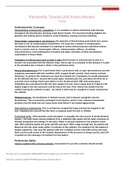
-
FISDAP - Paramedic Trauma Unit Exam Review/Study Guide
- Exam (elaborations) • 5 pages • 2022
-
- $12.49
- + learn more
Understand the Concepts: Disseminating intravascular coagulation: it is a condition in which small blood clots develop throughout the bloodstream, blocking small blood vessels. The increased clotting depletes the platelets and clotting factors needed to control bleeding, causing excessive bleeding. Hemorrhagic compensatory mechanisms: the reduction of blood during acute blood loss causes the body to use its compensatory mechanisms. The body has a number of compensatory mechanisms that become act...
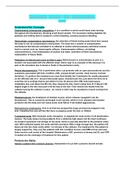
-
FISDAP - Paramedic Trauma Unit Exam Review/Study Guide
- Exam (elaborations) • 5 pages • 2022
-
- $12.49
- + learn more
Understand the Concepts: Disseminating intravascular coagulation: it is a condition in which small blood clots develop throughout the bloodstream, blocking small blood vessels. The increased clotting depletes the platelets and clotting factors needed to control bleeding, causing excessive bleeding. Hemorrhagic compensatory mechanisms: the reduction of blood during acute blood loss causes the body to use its compensatory mechanisms. The body has a number of compensatory mechanisms that become...

Study stress? For sellers on Stuvia, these are actually golden times. KA-CHING! Earn from your study resources too and start uploading now. Discover all about earning on Stuvia


